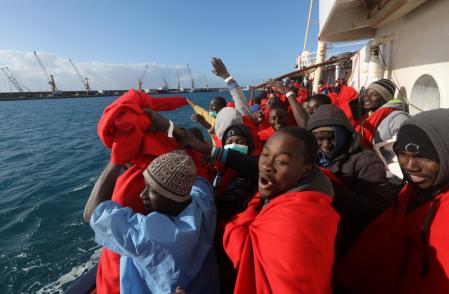
By Steve Scherer
ROME (Reuters) – Some 800 migrants were plucked from flimsy rubber boats on Thursday, Italy’s coast guard said, as Libya-based people smugglers took advantage of a window of good mid-winter weather to send them to sea.
Italian coast guard vessel Diciotti and two ships run by humanitarian groups, the Aquarius and the Golfo Azzurro, went to the rescue of a total of six rubber boats in international waters off the coast of Libya, the coast guard said.
Mathilde Auvillain, a spokeswoman for SOS Mediterranee which co-runs the Aquarius, said they aided a small wooden boat carrying 26 people, mostly Nigerians, on Wednesday, while 123 were taken off a rubber dinghy on Thursday.
After several days of rough seas, weather conditions improved on Wednesday evening and were expected to remain calm until Friday evening, she told Reuters by telephone.
“We are expecting another long year. There’s no sign that things are going to improve. So far this winter we have had no rest. We have not gone a full week without a rescue.”
Among the 149 rescued by the Aquarius were people from Nigeria, Sudan, Guinea, and Bangladesh, Auvillain said.
Last year a record 181,000 boat migrants, mostly from Africa, reached Italy. The majority paid Libyan people traffickers to make the journey.
With Libya still plagued by disorder and divided by rival governments and militias, it has become a safe haven for people smugglers and a dangerous place for migrants.
“The migrants are fleeing Libya as much as they are coming to Europe,” Auvillain said. Last year the Aquarius crew went to the rescue of 7,500 boat migrants, she said.
The European Union plans new measures to deter migrants crossing the Mediterranean from Libya, officials said, as Malta urged the bloc on Thursday to act to head off a surge in arrivals from the North African country.
The EU all but halted a migrant influx into Greece through a deal last year with Turkey to hold back Syrian refugees. But doing the same in Italy’s case is more problematic because of the lack of effective state authority in Libya.
(Reporting by Steve Scherer; editing by Mark Heinrich)